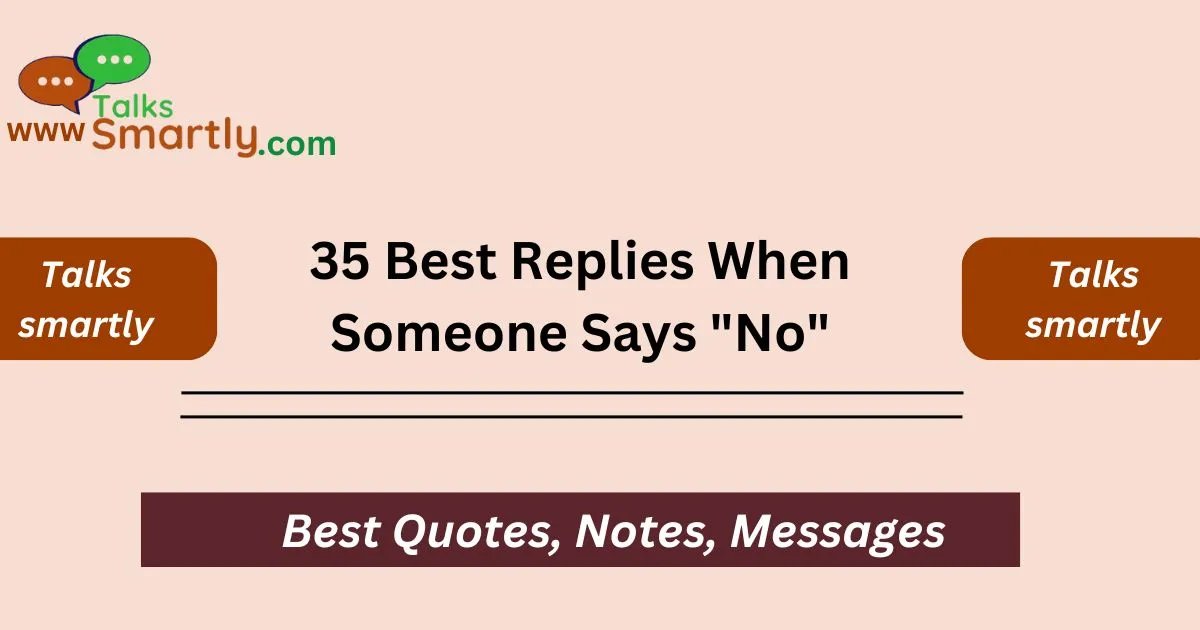“Navigating a “No” can be challenging, but having the right responses can turn a setback into an opportunity.”
Receiving a “No” can sometimes feel discouraging, but it’s an inevitable part of communication and negotiation. Whether you’re dealing with a personal request, a professional proposal, or just a casual conversation, knowing how to respond appropriately can help you maintain a positive relationship and perhaps even change the outcome. This blog post aims to provide you with 35 effective replies to use when someone says “No,” ensuring that you handle such situations with grace and tact.
If you’ve ever found yourself at a loss for words after a “No,” you’re not alone. This guide will equip you with responses that can help you address the situation constructively, keep the dialogue open, and show that you respect the other person’s position while also expressing your own needs. Read on to discover how you can turn a “No” into a stepping stone for further discussion or even a potential compromise.
We’ll cover a variety of responses suitable for different contexts, including personal and professional scenarios. Each response will be explained with an example to illustrate its use effectively. Let’s dive into these responses and find the best way to handle a “No.”
35 Best Replies When Someone Says “No”
- I understand, thank you for letting me know.
- I appreciate your honesty.
- Thanks for your response; I’ll consider other options.
- I see where you’re coming from.
- Thanks for your input. I’ll think about what you said.
- I respect your decision.
- Understood. Let’s see if there’s another way to approach this.
- I appreciate your feedback. I’ll adjust my plan accordingly.
- Thank you for your response. I’m open to other ideas.
- I understand your position. Let’s keep this in mind for the future.
- Thanks for letting me know. I’ll look into alternative options.
- I respect your viewpoint. Can we discuss other possibilities?
- Got it. I’ll work on finding a different solution.
- Thank you for your answer. I’m still interested in finding a way to make this work.
- I understand. Can we revisit this at a later time?
- I appreciate your straightforwardness.
- I see your point. Let’s explore other potential solutions.
- Thanks for your feedback. I’m open to hearing more about your perspective.
- I respect your decision. Is there a different approach you would suggest?
- I understand your concerns. Let’s see if we can find a middle ground.
- Thank you for sharing your thoughts. I’ll consider them carefully.
- I see your perspective. Can we discuss this further?
- Understood. I’ll look into other alternatives.
- Thank you for your response. Let’s see if we can work together on this.
- I appreciate your honesty. Are there any other suggestions you have?
- I respect your viewpoint. How can we address your concerns?
- Got it. I’ll seek other opportunities.
- Thank you for your feedback. I’m open to brainstorming other ideas.
- I understand where you’re coming from. Let’s explore other options.
- I appreciate your input. Is there another angle we could consider?
- Thank you for your response. I’m still interested in collaborating.
- I respect your decision. Can we find a compromise?
- I see your point. Let’s discuss how we might make this work.
- Thanks for your feedback. Let’s brainstorm additional solutions.
- I understand your position. Are there any other approaches you recommend?
1. I understand, thank you for letting me know.
This response shows appreciation for their clarity and acknowledges their position.
Example:
I understand, thank you for letting me know. If there’s anything else I can do or discuss, please let me know.
2. I appreciate your honesty.
A response that values their directness and maintains a positive tone.
Example:
I appreciate your honesty. It helps me understand your perspective better, and I’ll adjust my plans accordingly.
3. Thanks for your response; I’ll consider other options.
This reply acknowledges their answer and indicates that you’ll look for alternatives.
Example:
Thanks for your response; I’ll consider other options and see if there’s another way to achieve our goal.
4. I see where you’re coming from.
Shows that you understand their viewpoint, even if you don’t agree.
Example:
I see where you’re coming from. Your feedback is valuable, and I’ll keep it in mind as I move forward.
5. Thanks for your input. I’ll think about what you said.
Acknowledges their feedback and indicates that you’ll give it further thought.
Example:
Thanks for your input. I’ll think about what you said and see if there’s a way to address your concerns.
6. I respect your decision.

This response shows respect for their choice and maintains a positive tone.
Example:
I respect your decision. Let’s keep this in mind for future opportunities.
7. Understood. Let’s see if there’s another way to approach this.
Indicates that you’re open to finding alternative solutions.
Example:
Understood. Let’s see if there’s another way to approach this that might work better for both of us.
8. I appreciate your feedback. I’ll adjust my plan accordingly.
Shows that you value their feedback and are willing to make changes.
Example:
I appreciate your feedback. I’ll adjust my plan accordingly and see if we can come up with a better solution.
9. Thank you for your response. I’m open to other ideas.
Acknowledges their answer and shows openness to further suggestions.
Example:
Thank you for your response. I’m open to other ideas you might have that could work better.
10. I understand your position. Let’s keep this in mind for the future.
Acknowledges their stance and suggests revisiting the topic later.
Example:
I understand your position. Let’s keep this in mind for the future and see if there’s a possibility to revisit it later.
11. Thanks for letting me know. I’ll look into alternative options.
Shows appreciation and indicates that you’ll explore other possibilities.
Example:
Thanks for letting me know. I’ll look into alternative options and see if there’s another way to address this.
12. I respect your viewpoint. Can we discuss other possibilities?
Acknowledges their perspective and suggests discussing other options.
Example:
I respect your viewpoint. Can we discuss other possibilities that might be more agreeable to you?
13. Got it. I’ll work on finding a different solution.
Shows that you’ve understood their response and are committed to finding alternatives.
Example:
Got it. I’ll work on finding a different solution and get back to you with other options.
14. Thank you for your answer. I’m still interested in finding a way to make this work.
Shows persistence and willingness to find a workable solution.
Example:
Thank you for your answer. I’m still interested in finding a way to make this work, so let’s explore other options.
15. I understand. Can we revisit this at a later time?
Asks to revisit the topic later, indicating that you’re open to future discussions.
Example:
I understand. Can we revisit this at a later time and see if circumstances change?
16. I appreciate your straightforwardness.
Acknowledges their directness and shows gratitude.
Example:
I appreciate your straightforwardness. It helps me better understand your position and plan accordingly.
Funny Ways to Say “You Are Babysitting”
17. I see your point. Let’s explore other potential solutions.
Shows understanding and suggests looking at alternative solutions.
Example:
I see your point. Let’s explore other potential solutions that might address your concerns.
18. Thanks for your feedback. I’m open to hearing more about your perspective.
Shows appreciation and openness to further discussion.
Example:
Thanks for your feedback. I’m open to hearing more about your perspective and how we might address it.
19. I respect your decision. Is there a different approach you would suggest?
Acknowledges their decision and seeks their input on alternative approaches.
Example:
I respect your decision. Is there a different approach you would suggest that might work better for you?
20. I understand your concerns. Let’s see if we can find a middle ground.
Shows empathy and willingness to find a compromise.
Example:
I understand your concerns. Let’s see if we can find a middle ground that satisfies both of our needs.
21. Thank you for sharing your thoughts. I’ll consider them carefully.
Shows appreciation and indicates that you’ll think about their feedback.
Example:
Thank you for sharing your thoughts. I’ll consider them carefully and see how we can move forward.
22. I see your perspective. Can we discuss this further?
Acknowledges their viewpoint and suggests further discussion.
Example:
I see your perspective. Can we discuss this further to explore if there’s a way to address your concerns?
23. Understood. I’ll look into other alternatives.
Shows that you’ve understood their response and are exploring other options.
Example:
Understood. I’ll look into other alternatives and see if there’s another solution that might work better.
24. Thank you for your response. Let’s see if we can work together on this.
Acknowledges their response and suggests a collaborative approach.
Example:
Thank you for your response. Let’s see if we can work together on this to find a solution that works for both of us.
25. I appreciate your honesty. Are there any other suggestions you have?
Shows gratitude for their honesty and asks for further suggestions.
Example:
I appreciate your honesty. Are there any other suggestions you have that could help us move forward?
26. I respect your viewpoint. How can we address your concerns?
Acknowledges their viewpoint and seeks to address their concerns.
Example:
I respect your viewpoint. How can we address your concerns and find a way to make this work?
27. Got it. I’ll seek other opportunities.
Indicates that you understand their response and will look for other opportunities.
Example:
Got it. I’ll seek other opportunities and see if there’s another way to achieve our goal.
28. Thank you for your feedback. I’m open to brainstorming other ideas.
Shows appreciation and willingness to brainstorm alternative ideas.
Example:
Thank you for your feedback. I’m open to brainstorming other ideas that might be more suitable.
29. I understand where you’re coming from. Let’s explore other options.
Acknowledges their perspective and suggests exploring other options.
Example:
I understand where you’re coming from. Let’s explore other options that might better address your needs.
30. I appreciate your input. Is there another angle we could consider?
Shows appreciation and suggests considering different angles.
Example:
I appreciate your input. Is there another angle we could consider that might be more acceptable?
31. Thank you for your response. I’m still interested in collaborating.

Acknowledges their response and shows continued interest in collaboration.
Example:
Thank you for your response. I’m still interested in collaborating and would like to explore other possibilities.
32. I respect your decision. Can we find a compromise?
Acknowledges their decision and seeks a potential compromise.
Example:
I respect your decision. Can we find a compromise that might work for both of us?
33. I see your point. Let’s discuss how we might make this work.
Acknowledges their point and suggests discussing potential solutions.
Example:
I see your point. Let’s discuss how we might make this work and address any issues that arise.
34. Thanks for your feedback. Let’s brainstorm additional solutions.
Shows appreciation and willingness to brainstorm further solutions.
Example:
Thanks for your feedback. Let’s brainstorm additional solutions and see if we can find a better approach.
35. I understand your position. Are there any other approaches you recommend?
Acknowledges their position and seeks their recommendations for other approaches.
Example:
I understand your position. Are there any other approaches you recommend that could help us move forward?
ANSWER TO KEY QUESTION
1.What is the best way to respond when someone says “No” in a professional setting?
Use a respectful and understanding response, such as “I appreciate your feedback and will consider other options.”
2.How can I handle a “No” in a personal relationship?
Acknowledge their decision, show understanding, and express openness to future discussions.
3.Is it appropriate to negotiate after receiving a “No”?
Yes, if the context allows, you can ask if there is room for compromise or explore other possibilities.
4.What if I receive a “No” and feel that it’s not the final answer?
Respond with a willingness to revisit the topic later, such as “Can we discuss this again at a later time?”
5.How do I ensure my response to a “No” is not perceived as pushy?
Maintain a respectful tone, show appreciation for their input, and focus on exploring alternative solutions rather than insisting on your original request.
Conclusion
Responding to a “No” effectively requires a blend of empathy, respect, and adaptability. By using these 35 thoughtful replies, you can maintain positive relationships and keep communication channels open.
Whether in personal or professional contexts, how you handle a “No” can significantly impact the outcome of your interactions. Remember, a well-chosen response not only addresses the immediate situation but also sets the stage for future discussions and opportunities.












